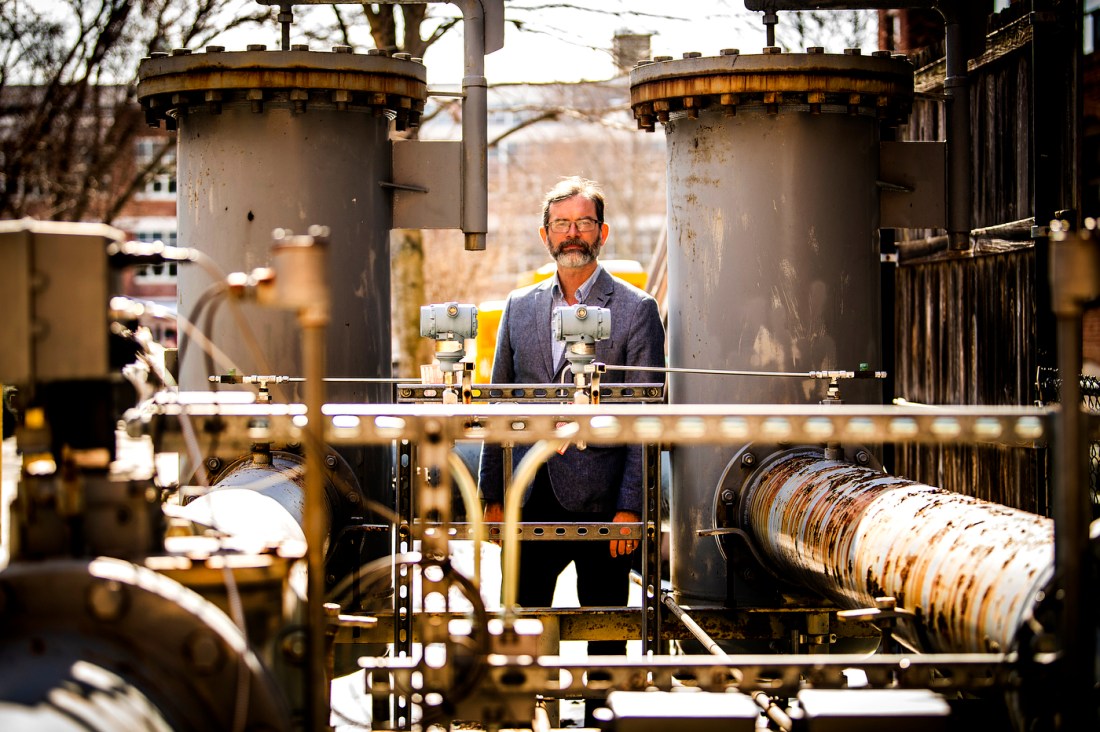When scientists talk about an industry’s effect on the environment, they often try to quantify the damage produced by that industry, says Matthew Eckelman, associate professor of civil and environmental engineering at Northeastern University.
“You look at a chemical that gets emitted from some industrial facility,” Eckelman says. “Where does that chemical go in the environment? What sort of population is it going to cause exposure to? And how much are they going to intake?”
“Then we can estimate how many cases of cancer there might be. How much extra asthma there might be, as a result.”
The field of industrial ecology makes an important intervention, he argues: “We try to quantify how many benefits there might be to nature” by re-engineering industrial approaches.
They can then make cost-benefit analyses that show policymakers the advantages of adopting processes rooted in ecology.

“Industry” and “ecology” may seem like unlikely bedfellows. “A lot of people see [those two words] and scratch their heads a little bit,” Eckelman says.
“Industrial ecology is a field of environmental management,” he says. Formalized in the late 1980s and 1990s, industrial ecology was a precursor to modern sustainability science.
“It was born out of business,” Eckelman continues. Industry professionals “saw the huge amount of waste” that went into production, with very little reuse of resources. “It’s a ridiculous way of designing,” he says. “It’s economically efficient,” but irresponsible toward natural resources.
“Sustainability science tends to be focused on more natural systems, whereas industrial ecology says, ‘How can we make the industrial system act more like nature?’”
In making industry more like nature, industrial ecologists ask questions like “How do we close loops?” Eckelman says, or what if “we could design a building to be totally deconstructed,” all its parts reusable. “The idea is that in nature, there is no waste.”
With Thomas Graedel, professor emeritus of industrial ecology and chemical engineering at Yale University, Eckelman has co-authored a new edition of the seminal textbook for industrial ecology, “Industrial Ecology and Sustainability.”
Graedel co-authored the first and second editions, titled simply “Industrial Ecology,” with B. R. Allenby of Bell Labs.
When Graedel wrote the first edition, “it was the first textbook in industrial ecology,” Eckelman says. But rather than just a new addition, Eckelman says, “We threw away everything from the previous version and started from scratch. So it’s essentially a new book.”
One of the new contributions Eckelman brought to the textbook is on health care and sustainability. Because “health care already has a mission,” he says, researchers are loath to suggest changes. “Nothing should get in the way of doctors doing what’s best for their patients.’”
But within the industry, “clinicians and staff see the wastefulness in our health care industry,” he argues. Health care generates “a pretty large portion of greenhouse gas emissions and overall resource use” in the United States.
“But you can change how things are made, how they’re designed, how they’re managed in inventory, the processes for dealing with energy use in hospitals.”
“And I’m proud to be one of the people who wrote some of the first papers in that area,” he notes. “So it’s nice to be able to shine a light on that.”
The textbook also teaches readers how to start thinking like ecologists. “You learn about natural food webs, and about the different trophic levels in nature,” in which resources and nutrients move along the food chain from plant producers all the way up to predators.
Industrial ecologists think of industry in much the same terms. “When you look at industrial systems, you can say, ‘Well, these are technical nutrients moving up the industrial food chain.’”
Gesturing to a disposable coffee cup, Eckelman says that the same ecological concepts demonstrate the wastefulness in single-use items.
“Nature would never do that. It helps you see — and reflect on — how wasteful the current system of production is.”
Beyond the engineering challenges industrial ecology can represent, often the biggest issue is that “people don’t talk to each other,” Eckelman says. “So you might have a steel plant right next to a cement plant. But it’s not like they get together for lunch.”
But that doesn’t mean an industrial ecologist can’t convince the two to communicate. “One might have materials that the other could use as a feedstock. And they’d save a lot of money, they’d save a lot of disposal costs and they’d have big environmental benefits.”
Once the appropriate parties are in the conversation, convincing them of the value of an industrial-ecological method becomes easy.
Many businesses have wanted to make greener products, or use greener processes, he goes on. “A lot of people look at industry and think they’re the bad guys.”
“There’s a lot of bad behavior, I don’t want to give them a free pass or anything. But there’s also a lot of desire to do things better,” whether out of ethical concerns or economic incentives.
“One thing that I think industrial ecology does very well is that it doesn’t put considerations” — whether environmental or economic — “in silos,” Eckelman says. Instead, those considerations are in constant dialogue.
Industrial ecology has been “very useful in engineering, but it pulls from ecology, it pulls from sociology, it pulls from business, it has a lot of perspectives.”
As a field, Eckelman says, “it’s very interdisciplinary.”
And it’s a field ripe for growth, he concludes. Many changes are obvious once you consider the whole picture. “Just to borrow a phrase from a friend of mine, it’s like you’re a giant in a valley of low-hanging fruit.”
Noah Lloyd is a senior writer for Northeastern Global News and NGN Research. Email him at n.lloyd@northeastern.edu. Follow him on X/Twitter at @noahghola.
